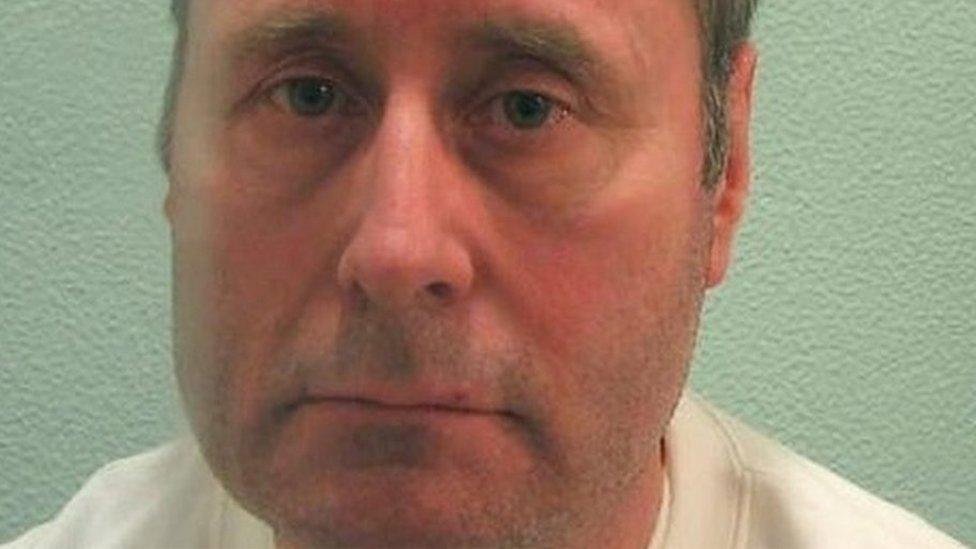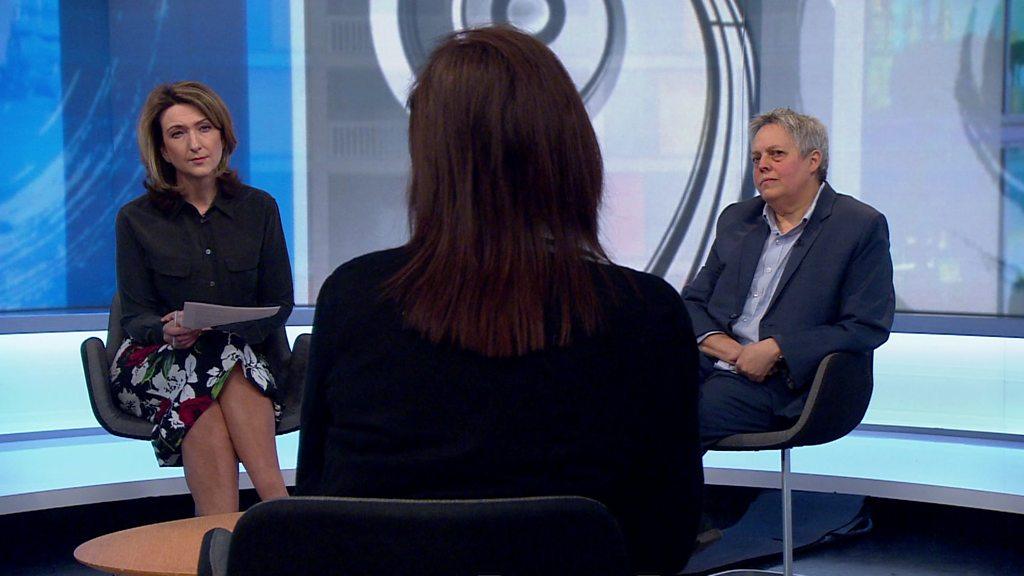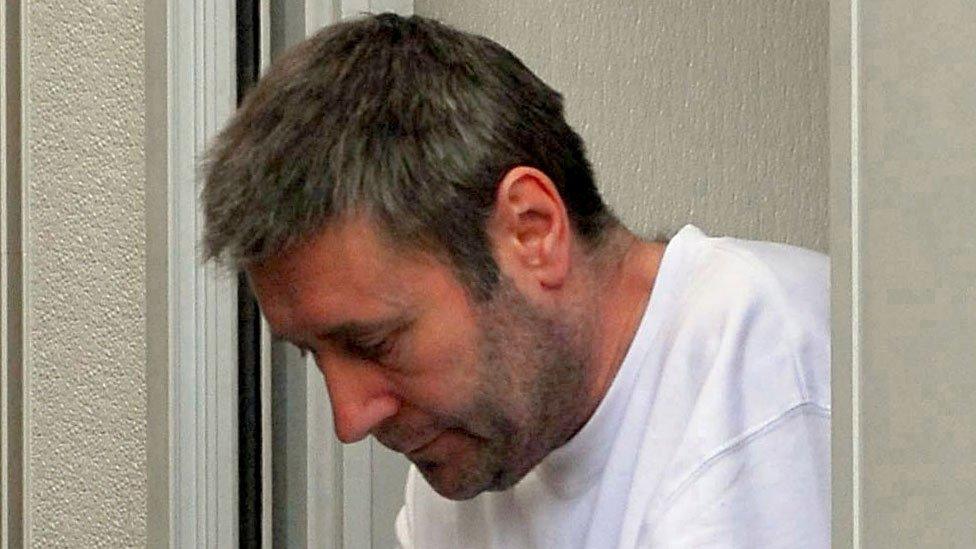John Worboys case: Met Police loses 'landmark' appeal
- Published
Women need to be confident police will investigate - John Worboys' victim
Victims of serious crime may be able to sue the police for failures in their investigations following a landmark ruling by the Supreme Court.
The Metropolitan Police lost an appeal against two rape victims, who won compensation over its handling of the case of black cab rapist John Worboys.
The women had argued their treatment by police breached their human rights.
The Met said it accepted the ruling and that there was "no doubt" it would have implications for future investigations.
Human rights organisation Liberty said it was a "landmark" decision.
The women said their treatment by police had caused them mental harm,
They brought their claims under article three of the Human Rights Act - the right not to be subjected to torture or to inhuman or degrading treatment.
Worboys was convicted of 19 offences in 2009, when he was ordered to serve at least eight years in jail.
But the Met believe he may have carried out more than 100 rapes and sexual assaults on women in London between 2002 and 2008.
A woman known as DSD - the first of Worboys' victims to make a complaint to the police in 2003 - said: "It has been an emotional day. Fifteen years."
In a question directed at the police, she added: "Had you done your job properly, there wouldn't be 105 victims, there would be one.
"I can take the one. I can't take the 105."
Her lawyer Harriet Wistrich said: "It's a very, very important judgment - very important for vindicating the rights of my two clients but also for the other victims of Worboys."
The women are also separately pursuing a judicial review of the Parole Board's decision to release the convicted rapist.
Allow X content?
This article contains content provided by X. We ask for your permission before anything is loaded, as they may be using cookies and other technologies. You may want to read X’s cookie policy, external and privacy policy, external before accepting. To view this content choose ‘accept and continue’.

Analysis: Legal correspondent Clive Coleman
The ruling is highly significant, both for victims of serious violent crime and for the police forces that investigate it.
It means that if a police force conducts an investigation into the crime which fails in a way which is deemed sufficiently serious, it will be liable to a human rights action brought by the victim.
Successful claims will result in compensation to the victims. The ruling means that there is an additional rigour placed on police forces to ensure they properly investigate violent crime.
The 2010 report by the Independent Police Complaints Commission disclosed many serious failings in the police investigation in Worboys.
So the ruling is likely to lead to more claims by his victims.
However there will be many other victims of violent crime who feel that they were let down by serious police failings, who will now want to consider bringing claims for breach of their human rights.

Until now, police could not be found to be negligent for generally failing to identify and apprehend an unknown suspect.
The police had appealed against the original judgement in favour of the women, arguing their duty was fulfilled simply by having in place practices and procedures to investigate.
Police chief Craig Mackey responds to the Supreme Court's Worboys judgment
But Supreme Court Justice Lord Kerr said: "By a majority, we have held that failures in the investigation of the crimes, provided they are sufficiently serious, will give rise to liability on the part of the police.
He continued: "The important point to make is that, if the investigation is seriously defective, even if no systemic failures are present, this will be enough to render the police liable."
The Met Police said it "unreservedly apologises" to the victims it failed.
Sir Craig Mackey, deputy commissioner of the Met Police, said in a statement that it had appealed because "police forces needed absolute clarity on the boundaries of police responsibility and liability for their investigations".
He added: "There is no doubt that it will have implications for how we resource and prioritise our investigations."
His views were echoed by Sir Peter Fahy, the former chief constable of Greater Manchester Police, who said there was concern that the ruling would lead to "a flood of claims, particularly from no-win, no-fee lawyers".
Speaking on Radio 4's the World at One, he said it would be important to see how the reference to "serious crime" is defined and which cases the ruling is applied to.
He said resources may be shifted from community policing to serious crimes as forces felt they had to investigate more thoroughly and document all decisions about taking investigations forward.

What duties are the police under to investigate?
Repeated rulings have made clear the police are not under a general duty of care in relation to their investigation of crime
Judges in key cases have ruled the police can't be liable for a crime committed by someone else
There are legal duties to warn someone their life may be in danger if police have intelligence of a threat
The Worboys case expands the law by saying that the police have a duty to act if a victim is going to become the victim of inhuman and degrading treatment

The appeal followed a 2013 High Court ruling which found the Met was liable to the women - known as DSD and NBV - for failures in its investigation.
DSD said she suffered a depressive disorder as a result of her treatment by officers during the 2003 investigation and was awarded £22,250.
NBV claimed she suffered serious distress, anxiety, guilt and an exacerbation of post-traumatic disorder and depression because of her treatment by police. She was awarded £19,000.
Martha Spurrier, director of Liberty, said: "Having already let these women down in the most horrific way, the Met could have accepted the High Court's ruling four years ago.
"Instead, they used taxpayers' money to drag them all the way to the highest court in the land."
The case comes a month after the government announced it would not challenge the Parole Board's decision to release Worboys after he had served less than 10 years in prison.
- Published4 January 2018

- Published21 February 2018

- Published19 January 2018
